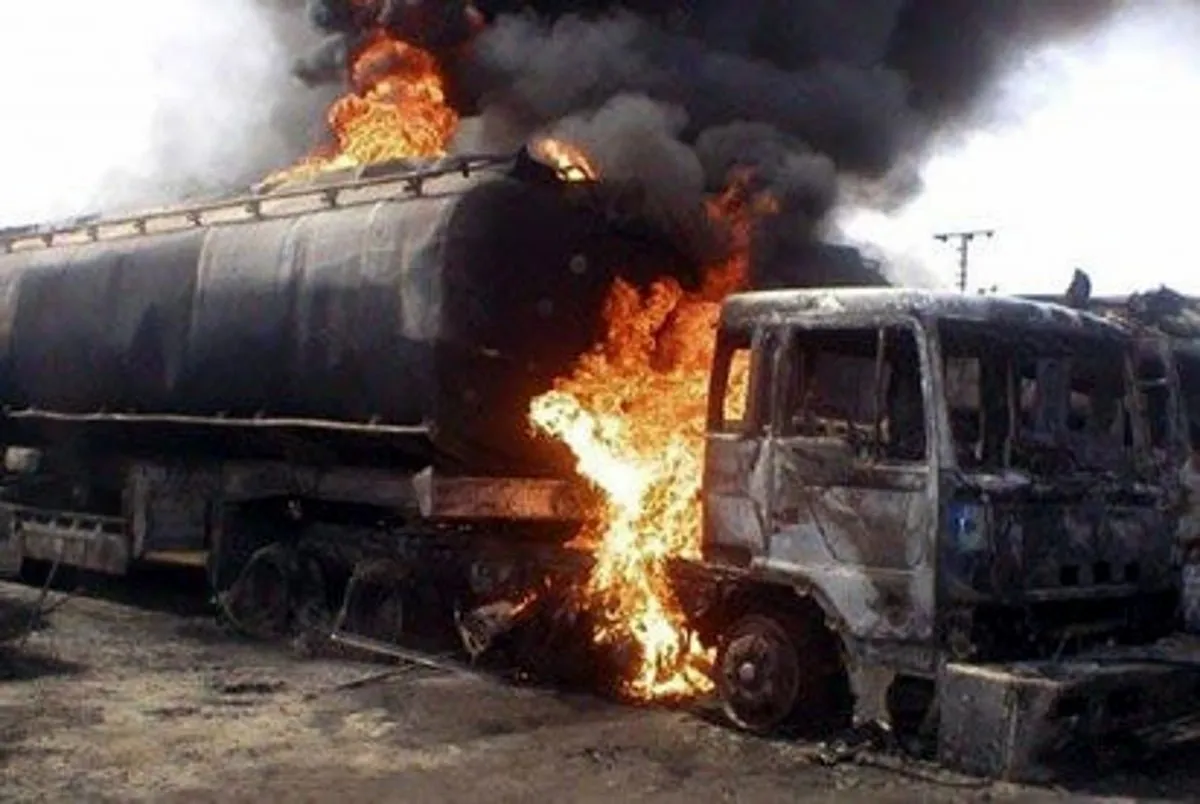Tanker accidents must be checked
On the night of October 13, 2023, an accident occurred on the Iganmu Bridge in Lagos. It was not the first time an accident would be occurring on that very spot, but the most recent one is significant, albeit for the reason that made it a tragedy. In this particular accident, where a petro-laden tanker […]

On the night of October 13, 2023, an accident occurred on the Iganmu Bridge in Lagos. It was not the first time an accident would be occurring on that very spot, but the most recent one is significant, albeit for the reason that made it a tragedy. In this particular accident, where a petro-laden tanker exploded on the bridge, 11 vehicles – two tankers, one tipper truck, three trailers, three cars and two mini buses known locally as korope – were involved.
As in previous instances, the cause is not unknown. From unlicensed and child drivers, to vehicles that have no business being on our roads as well as bad roads and people driving under the influence of alcohol or drugs, both inter- and intra-city journeys have become risky, with many people coming face to face with death every other day.
Indeed, due to the absence or non-implementation of transport guidelines across the country, it is not uncommon to come across fuel-laden tankers or articulated vehicles transporting dangerous containers struggling for space with passenger vehicles on our roads, which are mostly narrow and in poor condition.
The federal government, in July 2022, during a Stakeholders’ Forum on Haulage Transportation in Nigeria convened by then Secretary to the Government of the Federation, Boss Mustapha, banned tankers, trailers and other articulated vehicles that did not comply with the minimum safety measures from plying our roads. The forum, Mustapha said, stemmed from “the deep concern of the federal government on the rising spate of road traffic crashes involving articulated vehicles in recent times and high casualties in both human and material resources” and how to address the challenges.
Many trapped as oil tankers burst into flames in Lagos
Defaulters of income tax in FCT risk 3-year jail
Yet nothing has changed despite the ubiquitous presence of traffic-related officials on our roads. Many roads, including highways, have been taken over by indiscriminate parking by drivers of articulated vehicles. Such roads include the Badeggi-Bida road, Lapai-Bida road in Niger State, Jebba and Olooru in Kwara State, Tafa and Mararaban Jos in Kaduna State to mention but a few.
Data independently gathered by this newspaper showed that 309 were killed and more than 310 suffered various degrees of injuries in accidents involving tankers and other articulated vehicles in Nigeria in 80 incidents between January 2020 and October 21, 2023.
In one incident on July 22, 2020, at the Koko junction-Benin/Sapele expressway in Delta State, a tanker accident killed 20 people and injured 15 others, burning 10 vehicles. In the Felele area of Lokoja in Kogi State, 23 people were also killed. The carnage continued on April 18, 2021, at Oshigbudu-Obagaji Junction, Agatu Local Government of Benue State, where 11 people were killed and more than 50 houses burnt.
On September 28, 2022, at Maboro River Bridge, Ankpa Local Government Area of Kogi State, 20 people were killed. The latest being one that occurred along Ilorin-Jebba Road on Saturday, the 21st of October 2023, with five deaths and seven injuries. These are mostly caused by reckless driving and lack of vehicle maintenance, as 90% of them are over 30 years old. Most of the vehicles fell on the roads, discharging their ccontents, which caused deaths and damage to roads and the environment.
It is indeed disheartening that in 2023, we are still battling with the menace of tankers and articulated vehicles. Relevant government agencies have, mostly due to weakness, corruption, or both, allowed drivers of articulated vehicles to become law unto themselves. The laws guiding the operations of these vehicles are never strictly enforced, and violators punished to deter others from doing or committing the same offence.
Till date, we still have tankers/trailers parked by the roadside, even where there are designated parks for them. In some cases, the vehicles are parked along the road, not too far from their designated parks. Where drivers have complained of lack of facilities at the parks, efforts should be made to provide them.
The FRSC must discharge its responsibilities without fear or favour. Anyone found creating obstructions on our highways must be made to face the full wrath of the law. All acts of impunity must stop. Traffic rules violation is a serious offence and it should be treated as such.
There is a serious need to regulate the activities of articulated vehicles, where separate routes cannot be provided for them. Trailers should not be on the road during rush hours or where we have a high concentration of human population, like markets and schools, for instance.
Vehicle inspectors should be up and doing. They should pay more attention to safety than collecting pittance from drivers of articulated vehicles. Those charged with certifying drivers fit to drive on our roads should also be patriotic enough and shun acts of corruption, which sometimes cause them to allow unqualified drivers to be on our roads. Our roads are meant to ease movement from one point to another. We must not allow anyone to turn them into avenues for death and destruction.
